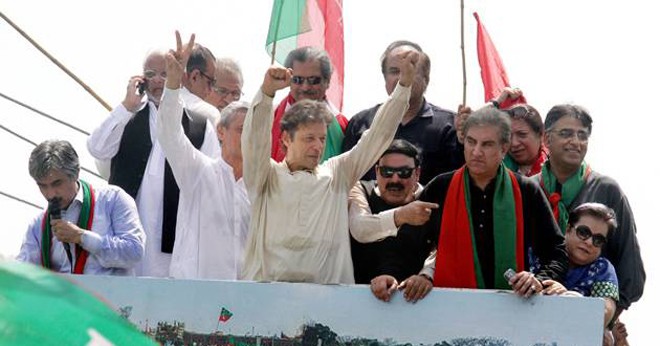

Imran Khan said many times in his speeches in the capital that he has burnt his boats and would never leave Islamabad or start dialogue with the government until Prime Minister Nawaz Sharif resigns.
Some TV anchors compare him with Tariq Bin Ziyad, a Muslim commander who led the conquest of Spain as he burnt the boats before the final attack. Others compare him with Napoléon Bonaparte and believe that his long march could be his Waterloo -- a final battle that ends his career.
It is not a good sign when a politician is compared with military generals. "No matter how you slice it, the optics for Khan are terrible," says Michael Kugelman, Senior Program Associate for South and Southeast Asia at Woodrow Wilson International Center for Scholars at Washington DC, via email.
Pakistani politics is one of Kugelman’s main areas of interest. "Khan failed to rally the huge numbers he promised; the government has failed to step down; and his decision to send marchers to the Red Zone has endangered the lives of women and children who are now in close proximity to heavily armed security forces."
The actions of Imran Khan, who portrays himself as an alternative to the current ‘corrupt and unjust’ system, threaten to undercut the very principles he seeks to uphold. If his supporters refuse to pay their taxes or utility bills, the chances of achieving better governance will only worsen.
"His stated support of a more rules-based, fair-justice, democratic system is certainly imperiled by his demand that a democratically elected government step down," says Kugelman. "There is short-sightedness -- even naivety -- in Imran Khan’s politics that may not be understood by his younger supporters, but is nonetheless very worrisome and potentially very harmful to the Pakistani state, and especially to the country’s fragile democratisation," he adds.
In his career as cricketer, philanthropist and now politician, Imran has come up as a clean man as far as financial corruption is concerned. But he seems to lack the training of a politician, and still banks on his reflexes to address the complex political problems.
"Imran represents that thinking of our society which believes others are responsible for our faults and wants to get results in haste," says Dr Khadim Hussain, an Islamabad-based political commentator and a critic of Imran Khan’s style of politics. "He has only been raising slogans without elaborating the strategy to achieve them. Look at the kind of language he has been using to address his opponents in his speeches; he is ridiculing the opponents like his followers do on social media."
There are many who believe that Khan has led his party to a blind alley with this long march. But there are others who term it as his persistence and determination -- to pursue the policy of his party.
"In almost all elections in past, there were accusations of rigging but the issue used to die a couple of months after the election. He has not only raised the rigging issue but has also followed it with persistence and, to an extent, has pushed the government on the backfoot," says Khawar Ghumman, an Islamabad-based senior political reporter.
"An egoistic person cannot be a good politician," says Wusatullah Khan, a columnist based in Karachi. Khan says Imran has his government in one province which he should have been able to present as a model for progress and good governance to the people of Pakistan. "If the people of Pakistan can trust him for making Shaukat Khanum Hospital a success, a province could have done wonders for him. But, I think he has at the back of his mind that unless he has federal government it is not possible to deliver."
"Sometimes Imran compares himself with Gandhi and Mandela but the next minute he sounds like a revolutionary leader. He will have to decide whether he believes in a struggle the way Gandhi and Mandela did for decades or wants to become a revolutionary leader," Khan adds.